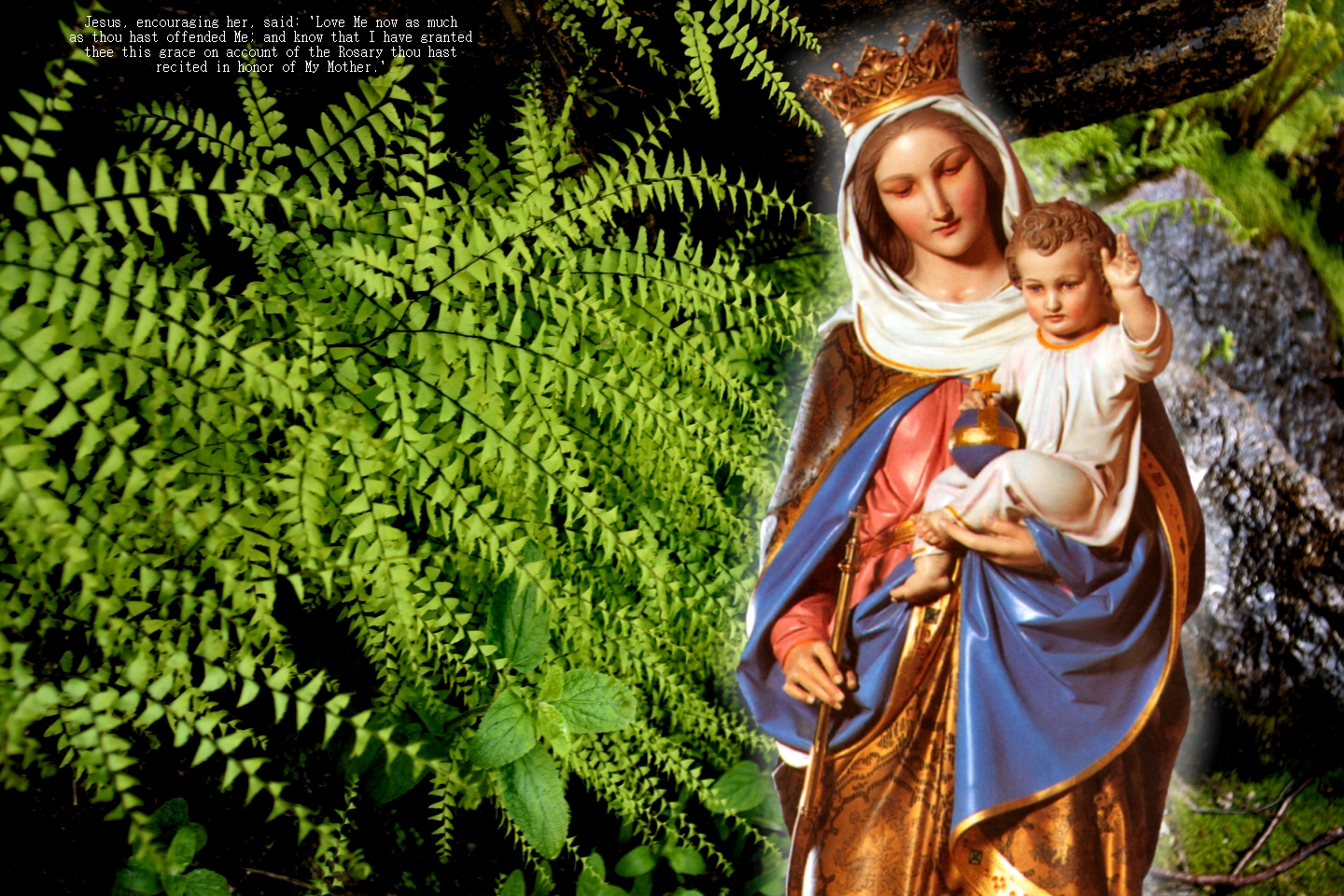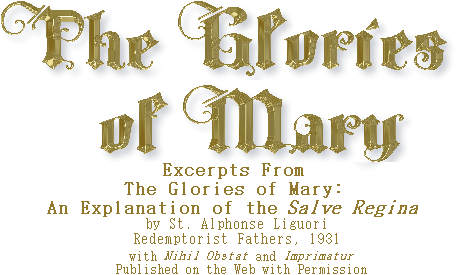
 VARIOUS EXAMPLES APPERTAINING TO THE MOST BLESSED VIRGIN MARY 1 There are some persons who make it a boast that they are free from prejudice, and pride themselves on believing no other miracles than those recorded in the sacred Scriptures, looking upon all others as tales and old women's fables. Here it is well to repeat a just remark made by the learned and pious Father John Crasset. He says, 'that as good people easily believe miracles, so are the wicked always ready to turn them into ridicule;' and he adds, 'that as it is a weakness to give credit to everything, so on the other hand does the rejection of miracles, when they are attested by grave and pious men, either savor of infidelity, because they are thought impossible to God, or of presumption, in denying the credibility of such a class of authors.' We give credit to a Tacitus and to a Suetonius; can we, then, refuse it without presumption to Christian, learned, and tried authors? Father Canisius says: 'There is less danger in believing and admitting that which is related with some appearance of truth by respectable authors, and which has not been rejected by learned men, which is moreover a subject of edification to our neighbor, than in rejecting it with a disdainful and presumptuous spirit.' EXAMPLES 1. In Germany a man fell into a grievous sin; through shame he was unwilling to confess it; but, on the other hand, unable to endure the remorse of his conscience, he went to throw himself into a river; on the point of doing so, he hesitated, and weeping, he begged that God would forgive him his sin without his confessing it. One night, in his sleep, he felt someone shake his arm, and heard a voice which said, Go to confession. He went to the church, but yet did not confess. On another night he again heard the same voice. He returned to the church; but when he got there, he declared that he would rather die than confess that sin. But before returning home he went to recommend himself to the most Blessed Virgin, whose image was in that church. He had no sooner knelt down than he found himself quite changed. He immediately got up, called a confessor, and weeping bitterly through the grace which he had received from Mary, made an entire confession of his sins; and he afterwards declared that he experienced greater satisfaction than had he obtained all the treasures of the world. 2. A young nobleman who was on a sea voyage began to read an obscene book, in which he took much pleasure. A religious noticed it, and said to him: 'Are you disposed to make a present to our Blessed Lady? The young man replied that he was. 'Well,' the other answered, 'I wish that, for the love of the most holy Virgin, you would give up that book, and throw it into the sea.' 'Here it is, father,' said the young man. 'No,' replied the religious, 'you must yourself make Mary this present.' He did so; and no sooner had he returned to Genoa, his native place, than the Mother of God so inflamed his heart with Divine love that he entered a religious order. 3. A hermit, on Mount Olivet, kept a devout image of Mary in his cell, and said many prayers before it. The devil, unable to endure such devotion to the Blessed Virgin, continually tormented him with impure thoughts; so much so, that the poor old hermit, seeing that all his prayers and mortifications did not deliver him, one day said to the enemy: 'What have I done to thee that thou tormentest me out of my life?' On this the devil appeared to him, and replied, 'Thou tormentest me much more than I do thee; but,' he added, 'if thou wilt swear to keep it secret, I will tell thee what thou hast to give up, that I may no more molest thee.' The hermit took the oath, and then the devil said: 'Thou must no more approach that image which thou hast in thy cell.' The hermit, perplexed at this, went to consult the Abbot Theodore, who told him that he was not bound by his oath, and that he must not cease to recommend himself to Mary before the image, as he had always done. The hermit obeyed, and the devil was put to shame and conquered. 4. A woman, who had carried on a criminal intercourse with two young men, one of whom, through jealousy, had killed the other, came one day in great alarm to confession to Father Humphrey d'Anna, of the congregation of the Pii Operarii, in the kingdom of Naples. She told the father that the wretched youth was no sooner dead than he appeared to her, clothed in black, bound in chains, fire issuing from every part of his body, and with a sword in his hand which he had already raised to cut her throat, when she cried out, calling him by his name, 'Ah, what have I done to thee, that thou shouldst take my life?' The damned soul, in a rage, replied, ' What hast thou done to me indeed, wretch that thou art?-----thou hast made me lose my God.' She then called on the Blessed Virgin; and at the sound of the most holy name of Mary, the specter disappeared, and was no more seen. 5. When Saint Dominic was preaching at Carcasone, in France, an Albigensian heretic, who, for having publicly ridiculed the devotion of the Rosary, was possessed by devils, was brought to him. The Saint then obliged the evil spirits to declare, whether the things which he said about the most holy Rosary were true. Howling, they replied, 'Listen, Christians: all that this enemy of ours has said of Mary, and of the most holy Rosary, is true.' They moreover added, 'that they had no power against the servants of Mary; and that many, by invoking in death the name of Mary, were saved, contrary to their deserts.' They concluded, saying: 'We are forced to declare, that no one is lost who perseveres in devotion to Mary and in that of the most holy Rosary, for Mary obtains for those who are sinners true repentance before they die.' Saint Dominic then made the people recite the Rosary; and, O prodigy, at every Hail Mary many evil spirits left the body of the possessed man under the form of red-hot coals; so that, when the Rosary was finished, he was entirely freed. On this occasion many heretics were converted. 6. The daughter of a prince had entered a convent, which was not very fervent, and in consequence, though she was naturally of a good disposition, she advanced but little in virtue. But having by the advice of a good confessor begun to say the Rosary, meditating at the same time on the mysteries, she so changed that she became a model for all. The nuns, however, displeased at her seclusion, did all that they could to make her give up the course she had traced out for herself. One day whilst she was saying the Rosary, and entreating Mary to help her in the persecution she underwent, a letter fell before her. On the outside was written, 'Mary, the Mother of God, to her daughter Johanna, greeting.' Inside it she read: 'My beloved daughter, continue to say my Rosary; avoid intercourse with those who do not help thee to live well; beware of sloth and vanity; banish two superfluous things from thy cell, and I will be thy protectress with God.' The abbot, under whose jurisdiction the monastery was, visited it soon after, and endeavored to reform it, but without success. He one day saw many devils enter the cells of the nuns, but not into that of Johanna; for the Divine Mother, before whom he saw her praying, drove them away. Having afterwards learnt from her the devotion of the Rosary which she practiced, and the letter she had received, he ordered all the nuns to do the same; and the account says that the convent became a paradise. 7. In Rome there was a woman known by the name of 'Catherine the Fair,' who was leading a most disorderly life. She once heard Saint Dominic preaching on the devotion of the Rosary, had her name enrolled in the confraternity, and began to recite it, but without changing her life. One evening a young man of noble mien came to visit her: she received him with courtesy, but, whilst they were at supper, she remarked, that as he was cutting bread drops of blood fell from his hands, and then she saw that there was blood on all the food he took. She asked him what was the meaning of this. The young man replied, that 'the food of a Christian should be tinged with the blood of Jesus Christ, and seasoned with the remembrance of His passion.' Astonished at such an answer, Catherine asked him who he was. 'Later,' he said, 'I will tell you.' Then going into an adjoining room, the appearance of the young man changed; he was crowned with thorns; his flesh all mangled and torn; and he said: 'Desirest thou to know Who I am? Dost thou not recognize Me? I am thy Redeemer. O, Catherine, when wilt thou cease offending Me? See what I have endured for thee. Thou hast now tormented Me enough; change thy life.' Catherine
burst into sobs and tears,
and
Jesus,
encouraging her, said: 'Love Me now as much as thou hast offended Me;
and
know that I have granted thee this grace on account of the Rosary thou
hast recited in honor of My Mother.' He then disappeared. On the next
morning
Catherine went to confession to Saint Dominic, distributed all she had
to the poor, and ever afterwards led so holy a life that she attained a
very high degree of perfection. Our Blessed Lady appeared many times to
her, and our Lord Himself revealed to Saint Dominic that this penitent
had become very dear to Him.
Continued forward. The Backgound, Ferns, is an adaptation of a public
domain image; you are free to use it.
DIRECTORIES-------MARY'S INDEX-------E-MAIL www.catholictradition.org/Mary/glories12.htm |



